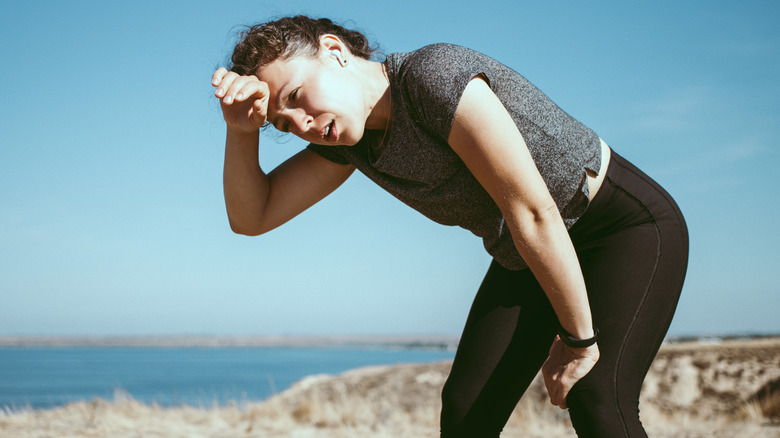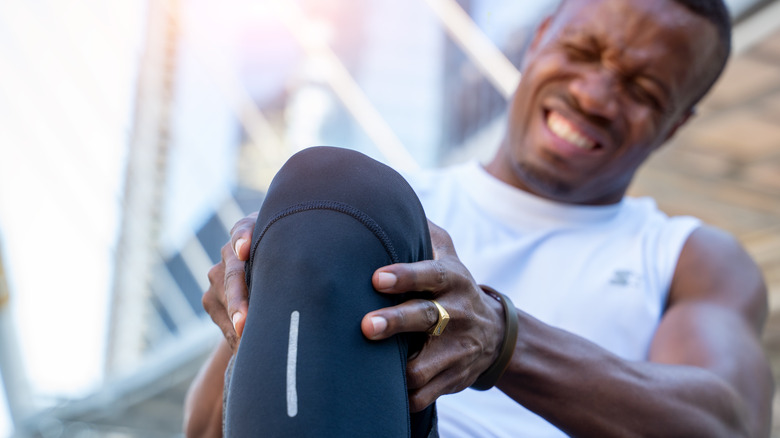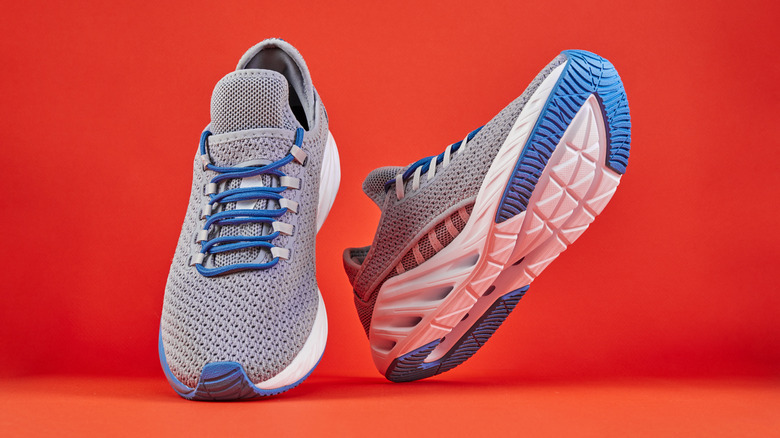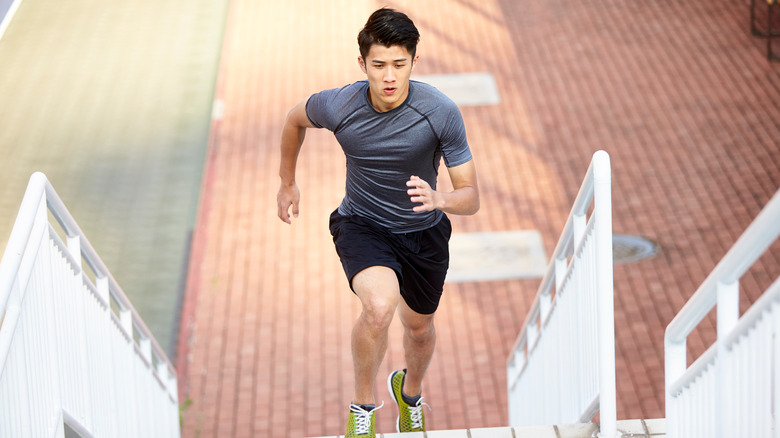Things You Should Never Do Before Going On A Run
Running is one of life's true joys. The feeling of lacing up your shoes and getting out on the open road, the wind in your hair as you smash through your personal best, coasting on that unbeatable runner's high afterward. Honestly, few things are better, folks. It seems like more and more people agree: In 2020, running saw a more than 200% increase in popularity among beginners (per Red Bull). Roughly 50 million Americans sought to get their exercise by pounding the pavement, shows research published by the Sports & Fitness Industry Association (via Livestrong).
So we're all agreed that running is one of the best cardio exercises — except, that is, when you have one of those workouts that leave you gasping for air, your stomach churning, and feeling like you never want to jog again. What gives? Well, the difference between the best run of your life, and the worst experience imaginable, could all be in the preparation. Taking one false move in the hours, or days, before you go for a run could ruin your hard work before it's even begun. And here at Health Digest, we want to put an end to this unknowing disruption to your joyful jogging, once and for all. Here are all the things you should never do before going on a run.
Eat a big meal
Making sure your nutrition is on-point is one of the keys to a successful workout routine, and figuring out how and what to eat before a run will largely depend on your style of training and your body's individual needs, explains BBC Good Food. But one thing you definitely shouldn't do on the food front is go big before you go running. Eating a large meal and then heading out for a run before it's fully digested can slow you down and make your performance worse, notes Healthline. It may also cause digestive or gastrointestinal issues, like diarrhea, an upset stomach, or cramping.
If you're going to be having a large meal, ensure you're leaving at least three to four hours for it to digest before you start running. If you feel you need a little boost just before exercising, eat a snack like a banana or some nuts between 30 minutes to two hours beforehand. And remember, you need to eat well after a run, especially if you're heading into exercise without eating anything prior. "Your post-run meal will aid recovery so if you do run fasted, it's vital to eat a proper meal containing carbs for energy replacement and a good source of protein for muscle repair as soon as possible," advises Renee McGregor, "Training Food" author and performance and clinical dietitian, to Coach Magazine.
Consume too much fiber
It's hard to overstate the importance of fiber. As well as helping your body move food through your system effectively, a diet high in fiber can assist in maintaining healthy blood sugar and cholesterol levels, and may even reduce the risk of death by chronic illness (per the Mayo Clinic). But as a runner, when you eat your daily fiber can make or break your run. "Timing is everything" when it comes to fiber, states Leslie Bonci, University of Pittsburgh Medical Center director of sports nutrition and registered dietitian (per Runner's World). As fiber slows digestion, it can sit in your system for a while, making you feel heavy, sluggish, and uncomfortable if you eat a lot of it just before you run.
It's useful, therefore, to plan your fiber intake around when you plan to run. Eating smaller amounts of fiber throughout the day instead of having it all in one go, or consuming larger amounts well before you exercise, will make you feel way more comfortable while exercising, Bonci says. Bear in mind, as well, that if you're not used to fiber, eating more of it will take your body some time to get used to, so start slowly and work up.
Skip the bathroom
We all know what it's like: You have limited time to squeeze in a run. You finally get out the door and before you know it, just when you're halfway around the track, you need the bathroom. Like, right now.
Unfortunately, this is a common (and pretty unpleasant) result of not going to the bathroom before exercise. "The vertical movement of running causes things to move through the colon, so not going to the bathroom before a long run or race may increase the chances of feeling something you don't want to feel while you run," warns Jason Karp, running coach and Run-Fit owner (via HuffPost).
While you might feel as though your body can hold on until after you're finished exercising, the last thing you want is to be caught short, so try and make time for the bathroom before you head out. Simple things in your pre-run routine, like drinking coffee or eating breakfast, encourage bowel movements. And if you're running a race, make sure you give yourself a little extra time beforehand — so you can get to the bathroom and do what you need to do.
Forget to drink enough water
Making sure you stay well-hydrated is important for every aspect of your health and lifestyle, but it's especially crucial around your running routine. "Running and sweating increases the amount of fluid we need," says Heidi Skolnik, sports nutritionist at Women's Sports Medicine Center (via the Hospital for Special Surgery). Without replacing these lost fluids, you can quickly become dehydrated, which may be exacerbated by the environment you're running in and the length of exercise — this can lead to poorer performance, fatigue, and headaches.
So be sure to drink enough water before you go running, to pre-empt the changes in your hydration levels. Around an hour or two before your run, it's recommended you drink between 6 and 16 ounces of water. And if plain water's not your thing, try jazzing it up with some fresh fruit or cucumber slices, or opt for a flavored seltzer. Don't forget to top up on your hydration after your run, too — most importantly, build your fluid consumption into your overall training routine. "You'll have a much easier time staying hydrated if you make it a part of your overall fueling plan," Skolnik states.
Ignore significant aches and pains
Feeling a little achy now and again around exercise is totally normal, and for the most part, low-level stiffness and soreness will clear up once the activity stops (per the Orthopedic Institute of Pennsylvania). But if any pain you have gets a little too acute, it's of paramount importance that you take it seriously. While your soreness might just mean tired muscles and that they're repairing themselves, soreness may also be caused by injury — if that's the case, not taking proper action to rest and heal may make it worse, according to WebMD.
If you sustain a workout injury, the most important thing you can do is give it enough time to heal fully before trying to exercise as you were before. As a general rule of thumb, injuries caused by exercise take around a month to heal entirely (via WebMD). Don't be fooled into thinking you're good to go when it doesn't hurt anymore: You need to give it around a week without experiencing pain to be sure that your injury's cleared up, explains WebMD. When you're finally back out running, ensure that you're gently building back up to the mileage and intensity you were doing before, to avoid another injury.
Perform static stretching
When you think of running, one of the first images that might come to mind is reaching down to touch your toes and stretching quads before taking your first step. But what if we told you that static stretching is one of the worst things you can do before going on a run? Here's the deal: Static stretching, where you hold a stretch position without moving, was actually found to slow runners down at the start of their race, as shown by research published in PLoS One. Although the overall running performance wasn't found to have been affected in the individuals taking part in the study, it was proposed by researchers that the static stretching performed reduced their ability to accelerate and propel themselves to full speed.
In that case, what do you do before a run to warm your muscles up? Well, stretching is still on the table, it's just how you do it that counts. A dynamic stretching routine works by using active, fluid movements to prep your body for exercise, effectively delivering the blood and oxygen your muscles need while simultaneously loosening up your joints, explains University of Iowa Hospitals & Clinics.
Do a big gym session
Whether it's down to scheduling or enthusiasm, sometimes you can find that you end up doing a lot of exercise back-to-back. But if you're planning to hit the gym hard before going out for a run, you might want to think twice, especially if it's leg day. "Doing heavy squats, lunges or deadlifts prior to running leaves you feeling fatigued, lethargic and with heavy legs," says Brad Whitley, physical therapist, to Livestrong. Resistance training burns through the glycogen that you store in your muscles which acts as fuel for exercise, and which you top up by eating carbohydrates — and when you've used up all your glycogen, your run suffers.
Instead, it's important to space things out a bit. Ideally, you want to keep your exercise activities to distinct days, with your run on one day and resistance training on another, to stop your body from being overloaded. If you do have to do both activities on the same day, consider the intensity of each workout, and keep one of them lighter. Hitting both as hard as possible might feel beneficial, but it may result in you working out less efficiently.
Drink alcohol
So you're heading home from an after-work drink, and you've suddenly been possessed with the urge to run. Or you're booked in for a race, but it's your buddy's birthday the night before and, well, it's been a long week.
In either of these scenarios, you might assume that a run after drinking alcohol might not be the worst thing in the world, and might even be invigorating. But trust us when we say you're better off avoiding the booze. "Studies have clearly shown the consumption of alcohol immediately before a race can negatively affect motor skills, coordination, balance, and response time," advises McKirven Ceus, medicine specialist at CareMount Medical, to Men's Journal.
Drinking alcohol and not giving your body enough time to bounce back will leave you dehydrated and sluggish, with your muscles inhibited in their ability to rebuild and grow — essentially, to recover properly. Drinking booze will also disrupt your sleep, meaning that if you're having alcohol the night before a run, you may be lacking in energy and therefore unable to perform to the best of your ability. And if that wasn't enough, alcohol can also wreak havoc on your blood sugar, once again disrupting your performance. In short? Save the drink for well after your run.
Use new shoes immediately
The trainers you use to run are one of the biggest factors in your performance, and when it's time to replace them, it's best not to put it off. On average, you get around 400 to 500 miles out of your running shoes, according to biomechanist Martyn Shorten. And when you're reaching maximum mileage, it's time to buy a new pair (via Runner's World).
It's important not to wear out your old shoes before buying new ones — while it might sound counterintuitive, you shouldn't be wearing your brand-new shoes exclusively straight away. "I wouldn't recommend throwing out your old pair and immediately jumping into your new pair," Shorten says, because your feet need time to slowly adjust to the feeling of the new shoe. Instead, when you have your new pair, continue running in your old shoes, but swap in your new ones with increasing frequency, over several weeks.
In your new shoes, avoid tackling any especially long runs — shorter distances will give your feet the chance to get familiar with the feel of it. Patience is key, and by alternating shoes for a while, you're prolonging the life of your new ones, too!
Eat too many carbs
If you're a runner, you'll likely know the importance of carbs. The energy source is vital to keep you fueled properly during a run and make your times and distance the best they can be (per Livestrong). But we can all have too much of a good thing, and eating too many carbs before going on a run may make things worse. When you eat a large number of carbs, your blood sugar can elevate quickly, making you feel more energized — but when that wears off (and it will, fast), you're sapped of energy and feel way more tired. For your running regimen, this initial energy spike might be useful for the first leg of your jog, but when you crash, that workout's gonna become hard.
To avoid this, your strategy with carbs should not be an "all-in-one-go" approach, but rather to spread them throughout your day to build up glycogen stores, especially if you're a long-distance runner (per Coach Magazine). Then, shortly before you go out for your run, eat a smaller amount of simpler carbs (oatmeal and banana are good examples) to sustain your exercise — normally, 40 to 60 grams will suffice.
Chug water
Drinking water throughout your day is very important. While that's not shocking to hear, it can be surprisingly easy to forget. So, if you're just about to go for a run and you suddenly realize that you're a little parched, chugging too much water to make up for it might seem sensible — but trust us when we say that it's really not.
"Trying to make up for dehydration in the hour prior to running can lead to that dreaded sloshy feeling in your stomach and call for a mid-run bathroom stop," explains Brad Whitley, physical therapist, to Livestrong. Alternatively, you should view hydration as something you keep on top of throughout the day, by sipping water during waking hours (per Brigham Health Hub). Don't rely on whether you feel thirsty or not as a way to tell whether you need to drink water, either. Check out the color of your pee instead. Dark urine means that you need to drink more fluids, whereas if it's light or clear, you're good to go.
And with regard to hydrating after a run? Measuring your rate of sweat is one option. "Take your weight before and after a run lasting an hour or more. Replace each pound of body weight lost with 20 to 24 ounces of water" (via Brigham Health Hub).
Drink too much coffee
If you're like us, you can't do much without your morning coffee. And on the surface of things, with its energy-boosting qualities, caffeine is a natural partner for exercise like running, to optimize your performance. Indeed, a study published in PLoS One found that consuming caffeine and coffee an hour before exercise improved the endurance of athletes during their exertion period, pointing toward the benefits of a cup of Joe before heading out.
However, it's important not to overdo it. While a smaller amount of caffeine may push you into peak performance territory, too much might end up upsetting your gastrointestinal system and cause digestive issues while you're running, explains Women's Running. Consuming too much caffeine can also induce other unpleasant symptoms, like headaches, dizziness, and/or anxiety, as well as contribute to dehydration, according to MedlinePlus.
A trial and error approach is the best thing to do when it comes to figuring out how much caffeine works for you before running — starting with smaller amounts. "Athletes need to 'listen' to their bodies and try coffee a few times before exercises," advises Mark Haub, Kansas State University professor of nutrition (per Women's Running).
Not listen to your body
Can we just take a sec and talk about how much we should love and acknowledge our bodies? Honestly. And if you're a runner, it's especially important to get in touch with your body and listen very carefully to what it's trying to tell you before a run. Paying attention to what your body's crying out for is crucial to a successful running routine, explains Pete Pfitzinger, exercise physiologist and former Olympian (via Runner's World). Not only does it allow you to key into when an ache might be an injury, or when it's time to rest, but it can also help you change your training regimen, guiding you toward favoring different surfaces or running speeds to avoid pain and maximize gain.
But understandably, the concept of "listening to your body" is vague — how do you actually do it? Pfitzinger suggests keeping a training journal, and writing down your body's responses to running patterns. If you feel pain during a run, it's easy to forget, but if you write it down after and note exactly where and why you felt it, you'll start to notice patterns and adjust your exercise for the better.
Forget to consider your outfit
So much prep can go into running — proper hydrating, nutrition, and warming-up — that it can be easy to deprioritize other aspects. But your running outfit is a key factor to consider for the success of your exercise. Other than the right running outfit making you look really good (and yes, some of us think that's important, even while running, and that's okay), picking optimum running gear will improve your performance and keep you comfortable while you run.
One key mistake people make is overdressing, especially when it's cold outside, leading to overheating during your run. A simple test can help you avoid this. "You should be uncomfortable standing outside as you wait for your watch to sync," says running coach Elizabeth Corkum to Runner's World. "If you're fine simply standing outside, the odds are good you'll overheat once you warm up into your run."
And clothes made with sweat-wicking fabrics can keep you from becoming weighed down with sweat or experiencing chafing (per Runner's World). T-shirts and leggings made from polyester, or with microfibers, are usually good choices.















